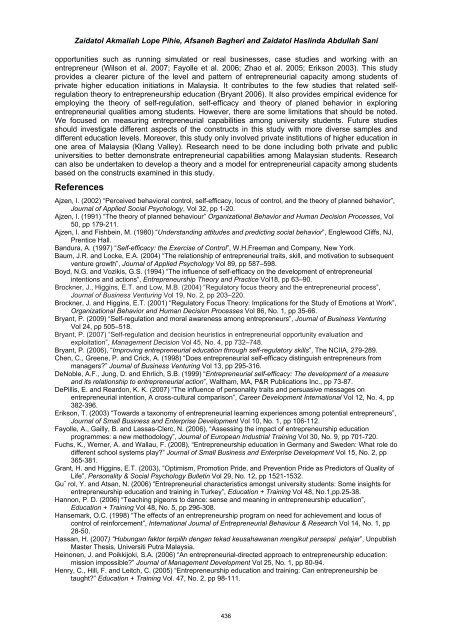A Proposal for a Standard With Innovation Management System
A Proposal for a Standard With Innovation Management System
A Proposal for a Standard With Innovation Management System
You also want an ePaper? Increase the reach of your titles
YUMPU automatically turns print PDFs into web optimized ePapers that Google loves.
Zaidatol Akmaliah Lope Pihie, Afsaneh Bagheri and Zaidatol Haslinda Abdullah Sani<br />
opportunities such as running simulated or real businesses, case studies and working with an<br />
entrepreneur (Wilson et al. 2007; Fayolle et al. 2006; Zhao et al. 2005; Erikson 2003). This study<br />
provides a clearer picture of the level and pattern of entrepreneurial capacity among students of<br />
private higher education initiations in Malaysia. It contributes to the few studies that related selfregulation<br />
theory to entrepreneurship education (Bryant 2006). It also provides empirical evidence <strong>for</strong><br />
employing the theory of self-regulation, self-efficacy and theory of planed behavior in exploring<br />
entrepreneurial qualities among students. However, there are some limitations that should be noted.<br />
We focused on measuring entrepreneurial capabilities among university students. Future studies<br />
should investigate different aspects of the constructs in this study with more diverse samples and<br />
different education levels. Moreover, this study only involved private institutions of higher education in<br />
one area of Malaysia (Klang Valley). Research need to be done including both private and public<br />
universities to better demonstrate entrepreneurial capabilities among Malaysian students. Research<br />
can also be undertaken to develop a theory and a model <strong>for</strong> entrepreneurial capacity among students<br />
based on the constructs examined in this study.<br />
References<br />
Ajzen, I. (2002) “Perceived behavioral control, self-efficacy, locus of control, and the theory of planned behavior”,<br />
Journal of Applied Social Psychology, Vol 32, pp 1-20.<br />
Ajzen, I. (1991) “The theory of planned behaviour” Organizational Behavior and Human Decision Processes, Vol<br />
50, pp 179-211.<br />
Ajzen, I. and Fishbein, M. (1980) “Understanding attitudes and predicting social behavior”, Englewood Cliffs, NJ,<br />
Prentice Hall.<br />
Bandura, A. (1997) “Self-efficacy: the Exercise of Control”, W.H.Freeman and Company, New York.<br />
Baum, J.R. and Locke, E.A. (2004) “The relationship of entrepreneurial traits, skill, and motivation to subsequent<br />
venture growth”, Journal of Applied Psychology Vol 89, pp 587–598.<br />
Boyd, N.G. and Vozikis, G.S. (1994) “The influence of self-efficacy on the development of entrepreneurial<br />
intentions and actions”, Entrepreneurship Theory and Practice Vol18, pp 63–90.<br />
Brockner, J., Higgins, E.T. and Low, M.B. (2004) “Regulatory focus theory and the entrepreneurial process”,<br />
Journal of Business Venturing Vol 19, No. 2, pp 203–220.<br />
Brockner, J. and Higgins, E.T. (2001) “Regulatory Focus Theory: Implications <strong>for</strong> the Study of Emotions at Work”,<br />
Organizational Behavior and Human Decision Processes Vol 86, No. 1, pp 35-66.<br />
Bryant, P. (2009) “Self-regulation and moral awareness among entrepreneurs”, Journal of Business Venturing<br />
Vol 24, pp 505–518.<br />
Bryant, P. (2007) “Self-regulation and decision heuristics in entrepreneurial opportunity evaluation and<br />
exploitation”, <strong>Management</strong> Decision Vol 45, No. 4, pp 732–748.<br />
Bryant, P. (2006), “Improving entrepreneurial education through self-regulatory skills”, The NCIIA, 279-289.<br />
Chen, C., Greene, P. and Crick, A. (1998) “Does entrepreneurial self-efficacy distinguish entrepreneurs from<br />
managers?” Journal of Business Venturing Vol 13, pp 295-316.<br />
DeNoble, A.F., Jung, D. and Ehrlich, S.B. (1999) “Entrepreneurial self-efficacy: The development of a measure<br />
and its relationship to entrepreneurial action”, Waltham, MA, P&R Publications Inc., pp 73-87.<br />
DePillis, E. and Reardon, K. K. (2007) “The influence of personality traits and persuasive messages on<br />
entrepreneurial intention, A cross-cultural comparison”, Career Development International Vol 12, No. 4, pp<br />
382-396.<br />
Erikson, T. (2003) “Towards a taxonomy of entrepreneurial learning experiences among potential entrepreneurs”,<br />
Journal of Small Business and Enterprise Development Vol 10, No. 1, pp 106-112.<br />
Fayolle, A., Gailly, B. and Lassas-Clerc, N. (2006), “Assessing the impact of entrepreneurship education<br />
programmes: a new methodology”, Journal of European Industrial Training Vol 30, No. 9, pp 701-720.<br />
Fuchs, K., Werner, A. and Wallau, F. (2008), “Entrepreneurship education in Germany and Sweden: What role do<br />
different school systems play?” Journal of Small Business and Enterprise Development Vol 15, No. 2, pp<br />
365-381.<br />
Grant, H. and Higgins, E.T. (2003), “Optimism, Promotion Pride, and Prevention Pride as Predictors of Quality of<br />
Life”, Personality & Social Psychology Bulletin Vol 29, No. 12, pp 1521-1532.<br />
Gu¨ rol, Y. and Atsan, N. (2006) “Entrepreneurial characteristics amongst university students: Some insights <strong>for</strong><br />
entrepreneurship education and training in Turkey”, Education + Training Vol 48, No.1,pp.25-38.<br />
Hannon, P. D. (2006) “Teaching pigeons to dance: sense and meaning in entrepreneurship education”,<br />
Education + Training Vol 48, No. 5, pp 296-308.<br />
Hansemark, O.C. (1998) “The effects of an entrepreneurship program on need <strong>for</strong> achievement and locus of<br />
control of rein<strong>for</strong>cement”, International Journal of Entrepreneurial Behaviour & Research Vol 14, No. 1, pp<br />
28-50.<br />
Hassan, H. (2007) “Hubungan faktor terpilih dengan tekad keusahawanan mengikut persepsi pelajar”, Unpublish<br />
Master Thesis, Universiti Putra Malaysia.<br />
Heinonen, J. and Poikkijoki, S.A. (2006) “An entrepreneurial-directed approach to entrepreneurship education:<br />
mission impossible?” Journal of <strong>Management</strong> Development Vol 25, No. 1, pp 80-94.<br />
Henry, C., Hill, F. and Leitch, C. (2005) “Entrepreneurship education and training: Can entrepreneurship be<br />
taught?” Education + Training Vol. 47, No. 2, pp 98-111.<br />
436

















